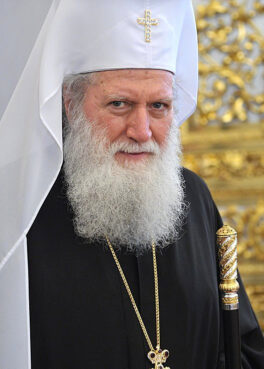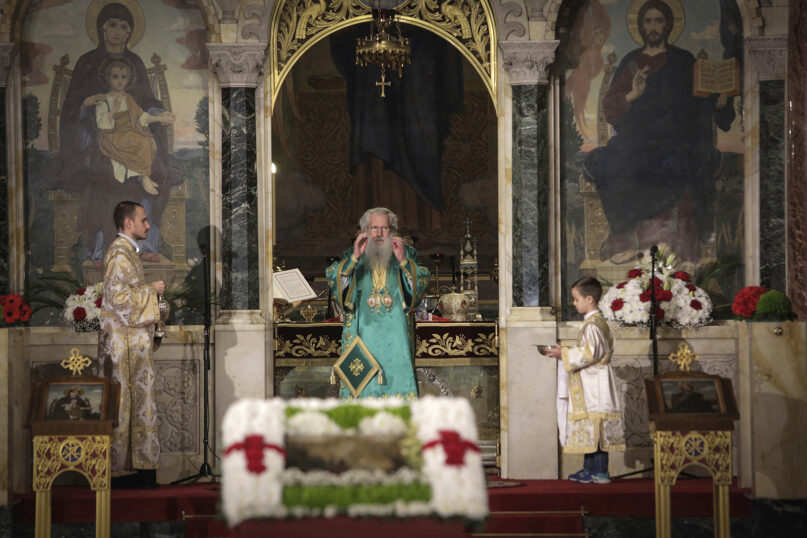ISTANBUL (RNS) — Neophyte I, patriarch of the Bulgarian Orthodox Church, has died at the age of 78 after a long illness, the church announced Wednesday (March 13).
According to the statement, his cause of death was multiple organ failure.
Neophyte, born Simeon Nikolov Dimitrov in Sofia, Bulgaria, was the third patriarch of the Bulgarian Orthodox Church since the patriarchate was restored in 1953 nearly 600 years after it was dismantled following Bulgaria’s conquest by the Ottoman Empire and schism with the ecumenical patriarch in Constantinople. Enthroned as patriarch in 2013, he was the church’s first leader to reign entirely after the shadow of communist rule.
During his decade of leadership, Neophyte was seen as a soft-spoken theologian who worked to bridge gaps between his faith and others in the often fractured Balkans.
He publicly welcomed Pope Francis when the pontiff visited his country in 2019, even while others in the Bulgarian Church viewed the visit as “an attack on Orthodoxy.”
“We keep the memory of the sincere brotherly Christian love of His Holiness Patriarch Neophyte, repeatedly expressed to the representatives of the Catholic Church and to the Bulgarian Catholic community,” the Bulgarian Catholic church said in a statement.

Patriarch Neophyte after his inauguration in 2013. (Photo courtesy of Wikipedia/Creative Commons)
“The death of the Primate of the Bulgarian Orthodox Church is a huge loss for it and for the Bulgarian people,” Bulgaria’s president, Rumen Radev, said in a Facebook post. “With his dedicated spiritual service to God and Orthodoxy, Patriarch Neophyte established himself as a supporter of the Bulgarian nation and our country.”
Neophyte was also well-regarded by Bulgaria’s non-Christian minorities. In 2019, he had joined Mustafa Hadzhi, the grand mufti of Bulgaria, in lobbying the government to forgive debts owed to the state by the country’s Muslim community.
“He will remain in our minds as an extremely good person and as a dialogic spiritual leader. The Muslim faith will remember him for his empathy and respect for the religious communities in the country, the search for agreement in the name of common positions, law-making, morality, education and traditional values that we have stood for together,” Hadzhi said.
Aleksander Oscar, president of Bulgaria’s Jewish community, told Religion News Service, “He will be remembered as a highly respected leader of the Bulgarian church, a dignified successor of the metropolitans Stefan and Kiril, blessed be their memory, righteous among the nations.” Oscar was referring to the World War II-era Bulgarian Orthodox leaders who worked to save Bulgaria’s nearly 50,000 Jews from death at the hands of Nazis.
As patriarch, Neophyte had a more complicated relationship with the far larger Russian Orthodox Church. Early in his tenure, Neophyte maintained close ties with his counterpart in Moscow, Patriarch Kirill. But last year, when the highest-ranking Russian Orthodox leader in Bulgaria was expelled from the country on accusations of espionage, Neophyte angered Moscow by appointing Bulgarian priests to run the Russian church.
Earlier this year, he gave his strongest condemnation of the Russian church’s role in the war in Ukraine.
“Our Lord, God, and the Holy Church bless only that army which does not demonstrate aggression and whose sole purpose is to protect and defend its people and country within internationally recognized territorial borders,” Neophyte said, referencing Moscow Patriarch Kirill’s blessings of Russian soldiers going to fight in Ukraine.
“In the Lord is our hope, even now that the power of evil rages so fiercely. The devastating war against our sister Ukraine once again reminded us all of the importance of the army for every nation and state,” Neophyte added.
Nonetheless, Patriarch Kirill said in a message of condolence to the Bulgarian Synod, “I remember the good fraternal communication with His Holiness Patriarch Neophyte, whose bright image will forever remain in my heart.”
The opening of Bulgaria’s state archives in 2012 revealed that in Neophyte’s days as a priest, he had been an asset of Bulgaria’s KGB-allied secret police, but showed little evidence that he informed on others. His file described him as “Very religious, devoted to the church.”
“I never wanted to defame anyone or benefit from the privileges” of the secret police, he said at the time, according to France 24.
Still, the revelation that most of Bulgaria’s major church leaders had collaborated with the communist regime significantly damaged the reputation of the church in the year before Neophyte’s ascension to patriarch.
After Neophyte’s funeral on Saturday, the church will begin the process of electing a successor, choosing him from among the nine of 15 total members of the Holy Synod of the Bulgarian Church who are eligible. According to church law, candidates must be above the age of 50 and have held the title of metropolitan, the equivalent of a Western Christian bishop, for at least five years.
While most of the candidates are church leaders in Bulgaria, one of the eligible is the New York-based Metropolitan Josef, who oversees the church’s diaspora in the United States, Canada and Australia.
Church law also dictates that the election must be held within four months.





